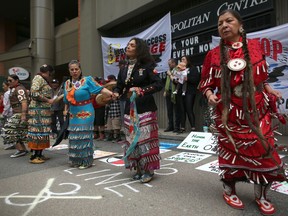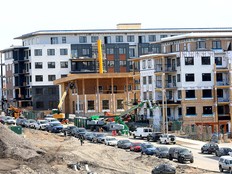Enbridge faces renewed pressure to address First Nations concerns at shareholder meeting

Article content
Enbridge Inc. faced renewed pressure Thursday to come to grips with an uninterrupted wave of First Nations opposition to pipeline projects both inside and outside its meeting of shareholders.
Inside a downtown Calgary conference centre, a group of activist shareholders launched a bid asking the company to disclose how it weighs indigenous rights and environmental risks when making new investments in pipelines.
The move came amid a new campaign by a coalition of First Nations opposing new pipelines that calls on major banks to pull their investments from companies behind these projects, including Enbridge, TransCanada Corp. and Kinder Morgan.
Al Monaco, Enbridge’s chief executive, said it’s important investors understand the company’s approach to building pipelines, including its efforts to consult with indigenous communities and understand their concerns.
“What we don’t want is for them to make decisions from the position of not understanding our approach,” Monaco told reporters, adding his company has a strong record respecting First Nations rights.
The Sisters of Charity, a non-profit and Enbridge shareholder, had proposed a resolution seeking a report outlining how Enbridge reviews indigenous and environmental risks linked to new acquisitions, after protests erupted over the Dakota Access Pipeline, in which Enbridge bought a nearly 28 per cent stake last year.
The resolution was defeated by nearly 70 per cent of voting shareholders, but Monaco promised new disclosure on the company’s approach to reviewing indigenous rights, though the Sisters said it doesn’t go far enough.
Chad Harrison, a councilman with the Standing Rock Sioux Tribe which was at the centre of the North Dakota protests, said the months-long demonstrations likely could have been avoided if the companies behind the project had been transparent and adequately consulted affected communities.
“As a large company, you guys are in a very unique position to be the frontrunners to push these things forward and be more inclusive of the people that these projects not only affect financially but also on the ground,” Harrison said, speaking in favour of the resolution at Enbridge’s meeting.
Monaco said the company would disclose in future reports how it handles indigenous issues when executing projects, its indigenous policies, and its efforts to consult early and often on projects.
The top executive later told reporters that during the heated protests over Dakota Access that attracted thousands of people last year, Enbridge had reconsidered its investment in the project, which had cleared many regulatory hurdles by the time the company invested.
Monaco said the company assessed whether previous consultations with indigenous communities were adequate and whether project proponents had responded to what they had heard.
“We spent a lot of time pondering this issue given the circumstances,” Monaco said, adding court rulings had confirmed indigenous concerns had been addressed in the project’s design.
“We were concerned just like everybody else; it’s hard not to be concerned when you see the images, so that caused us to go back and rethink it, and we did. And we were satisfied.”
As a group of more than 50 protestors gathered outside Enbridge’s shareholder meeting, the Canadian Council for Aboriginal Business held an economic development conference several blocks away.
JP Gladu, the council’s chief executive, said natural resources supported his family in Ontario, where a grandfather and his father were loggers, and another grandfather worked on natural gas pipelines. Still, he understood the frustration felt by many indigenous groups.
“We’ve been on the peripheral for a very long time,” Gladu said in an interview. “If we feel like we’re not being included, of course we’re going to push back.”
Earlier in the week, a coalition of 121 First Nations launched its campaign to demand banks withdraw their investments from companies behind new pipeline projects, which the communities fear will expand the oilsands and increase emissions.
Gladu wondered what impact the campaign could have on First Nations that support energy development. Fort McKay First Nation expects to seek financing from the bond market later this year to help pay for a 34 per cent stake in a Suncor Energy storage project.
“Whose side do you take?” Gladu said.”There are a lot of First Nations that are very much in favour of resource development.”
Outside Enbridge’s meeting, a First Nations campaigner who has been involved in opposing the company’s Line 3 project said she would also fight Fort McKay First Nation on its tank farm investment.
Winona LaDuke, executive director of Honor the Earth, said even though some supporters of oil and gas extraction are indigenous, it does not soften her resolve to oppose it.
LaDuke said she had flown from Minnesota to Calgary on a fuel-burning aircraft, but she said she didn’t have a choice.
“They have not come to me for three years,” she said. “I have asked them to talk to me and they haven’t, so we came here.”
Enbridge, however, said it has met with LaDuke several times, including when she was in Calgary on Thursday.






Postmedia is committed to maintaining a lively but civil forum for discussion. Please keep comments relevant and respectful. Comments may take up to an hour to appear on the site. You will receive an email if there is a reply to your comment, an update to a thread you follow or if a user you follow comments. Visit our Community Guidelines for more information.